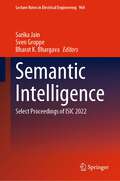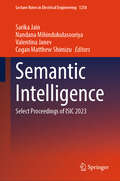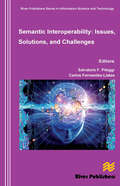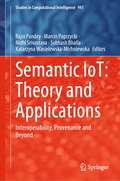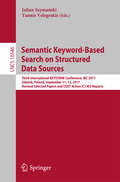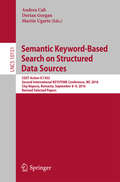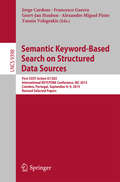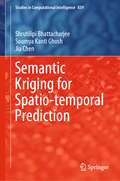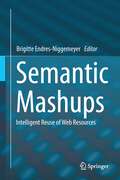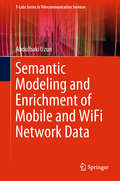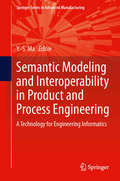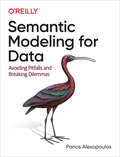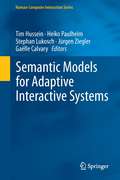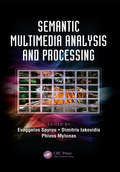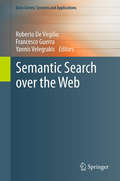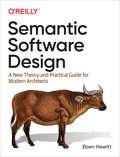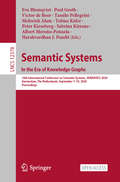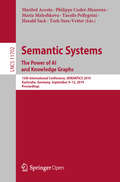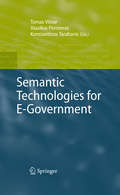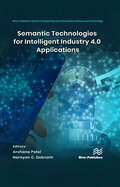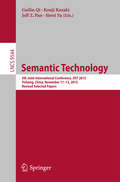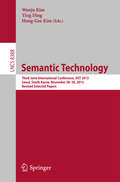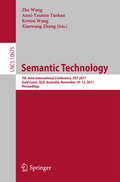- Table View
- List View
Semantic Intelligence: Select Proceedings of ISIC 2022 (Lecture Notes in Electrical Engineering #964)
by Sven Groppe Bharat K. Bhargava Sarika JainThis book constitutes refereed proceedings of the 2nd International Semantic Intelligence Conference (ISIC 2022). This book covers a wide range of topics, including semantic web engineering, ontology-based data access, multimodal and multilingual access, machine-to-machine communications and interoperability, knowledge extraction and ontology learning from the web, computational paradigms and computational intelligence, distributed and mobile systems, and many others. This book includes novel contributions and the latest developments from researchers across industry and academia. This book serves as a valuable reference resource for academics and researchers across the globe.
Semantic Intelligence: Select Proceedings of ISIC 2023 (Lecture Notes in Electrical Engineering #1258)
by Valentina Janev Sarika Jain Nandana Mihindukulasooriya Cogan Matthew ShimizuThis book constitutes refereed proceedings of the 3rd International Semantic Intelligence Conference (ISIC 2023). This book covers a wide range of topics, including semantic web engineering, ontology-based data access, multimodal and multilingual access, machine-to-machine communications and interoperability, knowledge extraction and ontology learning from the web, computational paradigms and computational intelligence, distributed and mobile systems, and many others. This book includes novel contributions and the latest developments from researchers across industry and academia. This book serves as a valuable reference resource for academics and researchers across the globe.
Semantic Interoperability Issues, Solutions, Challenges (River Publishers Series In Information Science And Technology Ser.)
by Carlos Fernandez-Llatas Salvatore F. PileggiSemantic technologies are experimenting an increasing popularity in the context of different domains and applications. The understanding of any class of system can be significantly changed under the assumption any system is part of a global ecosystem known as Semantic Web.The Semantic Web would be an evolving extension of current Web model (normally referred as Syntactic Web) that introduces a semantic layer in which semantics, or meaning of information, are formally defined.So, semantics should integrate web-centric standard information infrastructures improving several aspects of interaction among heterogeneous systems. This is because common interoperability models are progressively becoming obsolete if compared with the intrinsic complexity and always more distributed focus that feature modern systems. For example, the basic interoperability model, that assumes the interchange of messages among systems without any interpretation, is simple but effective only in the context of close environments. Also more advanced models, such as the functional interoperability model that integrates basic interoperability model with the ability of intepretating data context under the assumption of a shared schema for data fields accessing, appears not able to provide a full sustainable technologic support for open systems.The Semantic Interoperability model would improve common interoperability models introducing the interpretation of means of data. Semantic interoperability is a concretely applicable interaction model under the assumption of adopting rich data models (commonly called Ontology) composed of concepts within a domain and the relationships among those concepts.In practice, semantic technologies are partially inverting the common view at actor intelligence: intelligence is not implemented (only) by actors but it is implicitly resident in the knowledge model. In other words, schemas contain information and the "code" to interpretate it.
Semantic IoT: Interoperability, Provenance and Beyond (Studies in Computational Intelligence #941)
by Subhash Bhalla Marcin Paprzycki Rajiv Pandey Nidhi Srivastava Katarzyna Wasielewska-MichniewskaThis book is focused on an emerging area, i.e. combination of IoT and semantic technologies, which should enable breaking the silos of local and/or domain-specific IoT deployments. Taking into account the way that IoT ecosystems are realized, several challenges can be identified. Among them of definite importance are (this list is, obviously, not exhaustive): (i) How to provide common representation and/or shared understanding of data that will enable analysis across (systematically growing) ecosystems? (ii) How to build ecosystems based on data flows? (iii) How to track data provenance? (iv) How to ensure/manage trust? (v) How to search for things/data within ecosystems? (vi) How to store data and assure its quality? Semantic technologies are often considered among the possible ways of addressing these (and other, related) questions. More precisely, in academic research and in industrial practice, semantic technologies materialize in the following contexts (this list is, also, not exhaustive, but indicates the breadth of scope of semantic technology usability): (i) representation of artefacts in IoT ecosystems and IoT networks, (ii) providing interoperability between heterogeneous IoT artefacts, (ii) representation of provenance information, enabling provenance tracking, trust establishment, and quality assessment, (iv) semantic search, enabling flexible access to data originating in different places across the ecosystem, (v) flexible storage of heterogeneous data. Finally, Semantic Web, Web of Things, and Linked Open Data are architectural paradigms, with which the aforementioned solutions are to be integrated, to provide production-ready deployments.
Semantic Keyword-Based Search on Structured Data Sources
by Yannis Velegrakis Julian SzymańskiThis book constitutes the thoroughly refereed post-conference proceedings of the Third COST Action IC1302 International KEYSTONE Conference on Semantic Keyword-Based Search on Structured Data Sources, IKC 2017, held in Gdańsk, Poland, in September 2017.The 13 revised full papers and 5 short papers included in the first part of the book were carefully reviewed and selected from numerous submissions. The second part contains reports that summarize the major activities and achievements that have taken place in the context of the action: the short term scientific missions, the outcome of the summer schools, and the results achieved within the following four work packages: representation of structured data sources; keyword search; user interaction and keyword query interpretation; and research integration, showcases, benchmarks and evaluations. Also included is a short report generated by the chairs of the action. The papers cover a broad range of topics in the area of keyword search combining expertise from many different related fields such as information retrieval, natural language processing, ontology management, indexing, semantic web and linked data.
Semantic Keyword-Based Search on Structured Data Sources: COST Action IC1302 Second International KEYSTONE Conference, IKC 2016, Cluj-Napoca, Romania, September 8–9, 2016, Revised Selected Papers (Lecture Notes in Computer Science #10151)
by Andrea Calì Dorian Gorgan Martín UgarteThis book constitutes the thoroughly refereed post-conference proceedings of the Second COST Action IC1302 International KEYSTONE Conference on Semantic Keyword-Based Search on Structured Data Sources, IKC 2016, held in Cluj-Napoca, Romania, in September 2016. The 15 revised full papers and 2 invited papers are reviewed and selected from 18 initial submissions and cover the areas of keyword extraction, natural language searches, graph databases, information retrieval techniques for keyword search and document retrieval.
Semantic Keyword-based Search on Structured Data Sources: First Cost Action Ic1302 International Keystone Conference, Ikc 2015, Coimbra, Portugal, September 8-9, 2015. Revised Selected Papers (Lecture Notes in Computer Science #9398)
by Jorge Cardoso Francesco Guerra Geert-Jan Houben Alexandre Miguel Pinto Yannis VelegrakisThis book constitutes the thoroughly refereedpost-conference proceedings of the First COST Action IC1302 InternationalKEYSTONE Conference on semantic Keyword-based Search on Structured Data Sources,IKC 2015, held in Coimbra, Portugal, in September 2015. The 13 revised full papers, 3 revised short papers, and 2 invited papers werecarefully reviewed and selected from 22 initial submissions. The paper topicscover techniques for keyword search, semantic data management, social Web andsocial media, information retrieval, benchmarking for search on big data.
Semantic Knowledge Modelling via Open Linked Ontologies: Ontologies in E-Governance (Artificial Intelligence-Enhanced Software and Systems Engineering #4)
by George A. Tsihrintzis Stamatios TheocharisEvolving technological advances in Artificial Intelligence-empowered Software present significant potential to lead e-Government towards more collective efforts, exchange of experiences on best practices both at national and international levels and dissemination of secluded administrative knowledge. In this book, novel semantic web-based and linked open data-based approaches are developed for the modelling and management of the huge volume of administrative data and the procedures followed by public sector bodies and for the production and management of relevant administrative knowledge. The book consists of eight chapters, each of which includes relevant bibliographic references for deeper probing. Appendices complement this work with sections of configuration files of the applications developed and used. Professors, researchers, scientists, engineers and students in artificial intelligence, e-government and other computer science-related disciplines are expected to benefit greatly from it, along with non-specialist readers from other disciplines who are interested in getting versed in the recent developments in e-government.
Semantic Kriging for Spatio-temporal Prediction (Studies in Computational Intelligence #839)
by Shrutilipi Bhattacharjee Soumya Kanti Ghosh Jia ChenThis book identifies the need for modeling auxiliary knowledge of the terrain to enhance the prediction accuracy of meteorological parameters. The spatial and spatio-temporal prediction of these parameters are important for the scientific community, and the semantic kriging (SemK) and its variants facilitate different types of prediction and forecasting, such as spatial and spatio-temporal, a-priori and a-posterior, univariate and multivariate. As such, the book also covers the process of deriving the meteorological parameters from raw satellite remote sensing imagery, and helps understanding different prediction method categories and the relation between spatial interpolation methods and other prediction methods. The book is a valuable resource for researchers working in the area of prediction of meteorological parameters, semantic analysis (ontology-based reasoning) of the terrain, and improving predictions using auxiliary knowledge of the terrain.
Semantic Mashups
by Brigitte Endres-NiggemeyerMashups are mostly lightweight Web applications that offer new functionalities by combining, aggregating and transforming resources and services available on the Web. Popular examples include a map in their main offer, for instance for real estate, hotel recommendations, or navigation tools. Mashups may contain and mix client-side and server-side activity. Obviously, understanding the incoming resources (services, statistical figures, text, videos, etc.) is a precondition for optimally combining them, so that there is always some undercover semantics being used. By using semantic annotations, neutral mashups permute into the branded type of semantic mashups. Further and deeper semantic processing such as reasoning is the next step. The chapters of this book reflect the diversity of real-life semantic mashups. Two overview chapters take the reader to the environments where mashups are at home and review the regulations (standards, guidelines etc.) mashups are based on and confronted with. Chapters focusing on DBpedia, search engines and the Web of Things inspect the main Web surroundings of mashups. While mashups upgrading search queries may be nearer to the everyday experience of readers, mashups using DBpedia input and sensor data from the real world lead to important new and therefore less known developments. Finally, the diversity of mashups is tracked through a few application areas: mathematical knowledge, speech, crisis and disaster management, recommendations (for games), inner-city information, and tourism. Participants of the AI Mashup Challenge wrote all the chapters of this book. The authors were writing for their current and future colleagues - researchers and developers all over the Web who integrate mashup functionalities into their thinking and possibly into their applications.
Semantic Modeling and Enrichment of Mobile and WiFi Network Data (T-Labs Series in Telecommunication Services)
by Abdulbaki UzunThis book discusses the fusion of mobile and WiFi network data with semantic technologies and diverse context sources for offering semantically enriched context-aware services in the telecommunications domain.It presents the OpenMobileNetwork as a platform for providing estimated and semantically enriched mobile and WiFi network topology data using the principles of Linked Data. This platform is based on the OpenMobileNetwork Ontology consisting of a set of network context ontology facets that describe mobile network cells as well as WiFi access points from a topological perspective and geographically relate their coverage areas to other context sources.The book also introduces Linked Crowdsourced Data and its corresponding Context Data Cloud Ontology, which is a crowdsourced dataset combining static location data with dynamic context information. Linked Crowdsourced Data supports the OpenMobileNetwork by providing the necessary context data richness for more sophisticated semantically enriched context-aware services.Various application scenarios and proof of concept services as well as two separate evaluations are part of the book. As the usability of the provided services closely depends on the quality of the approximated network topologies, it compares the estimated positions for mobile network cells within the OpenMobileNetwork to a small set of real-world cell positions. The results prove that context-aware services based on the OpenMobileNetwork rely on a solid and accurate network topology dataset. The book also evaluates the performance of the exemplary Semantic Tracking as well as Semantic Geocoding services, verifying the applicability and added value of semantically enriched mobile and WiFi network data.
Semantic Modeling and Interoperability in Product and Process Engineering
by Yongsheng MaIn the past decade, feature-based design and manufacturing has gained some momentum in various engineering domains to represent and reuse semantic patterns with effective applicability. However, the actual scope of feature application is still very limited. Semantic Modeling and Interoperability in Product and Process Engineering provides a systematic solution for the challenging engineering informatics field aiming at the enhancement of sustainable knowledge representation, implementation and reuse in an open and yet practically manageable scale. This semantic modeling technology supports uniform, multi-facet and multi-level collaborative system engineering with heterogeneous computer-aided tools, such as CADCAM, CAE, and ERP. This presented unified feature model can be applied to product and process representation, development, implementation and management. Practical case studies and test samples are provided to illustrate applications which can be implemented by the readers in real-world scenarios. By expanding on well-known feature-based design and manufacturing approach, Semantic Modeling and Interoperability in Product and Process Engineering provides a valuable reference for researchers, practitioners and students from both academia and engineering field.
Semantic Modeling for Data: Avoiding Pitfalls And Breaking Dilemmas
by Panos AlexopoulosWhat value does semantic data modeling offer? As an information architect or data science professional, let’s say you have an abundance of the right data and the technology to extract business gold—but you still fail. The reason? Bad data semantics.In this practical and comprehensive field guide, author Panos Alexopoulos takes you on an eye-opening journey through semantic data modeling as applied in the real world. You’ll learn how to master this craft to increase the usability and value of your data and applications. You’ll also explore the pitfalls to avoid and dilemmas to overcome for building high-quality and valuable semantic representations of data.Understand the fundamental concepts, phenomena, and processes related to semantic data modelingExamine the quirks and challenges of semantic data modeling and learn how to effectively leverage the available frameworks and toolsAvoid mistakes and bad practices that can undermine your efforts to create good data modelsLearn about model development dilemmas, including representation, expressiveness and content, development, and governanceOrganize and execute semantic data initiatives in your organization, tackling technical, strategic, and organizational challenges
Semantic Models for Adaptive Interactive Systems
by Gaëlle Calvary Stephan Lukosch Tim Hussein Jürgen Ziegler Heiko PaulheimProviding insights into methodologies for designing adaptive systems based on semantic data, and introducing semantic models that can be used for building interactive systems, this book showcases many of the applications made possible by the use of semantic models. Ontologies may enhance the functional coverage of an interactive system as well as its visualization and interaction capabilities in various ways. Semantic models can also contribute to bridging gaps; for example, between user models, context-aware interfaces, and model-driven UI generation. There is considerable potential for using semantic models as a basis for adaptive interactive systems. A variety of reasoning and machine learning techniques exist that can be employed to achieve adaptive system behavior. The advent and rapid growth of Linked Open Data as a large-scale collection of semantic data has also paved the way for a new breed of intelligent, knowledge-intensive applications. Semantic Models for Adaptive Interactive Systems includes ten complementary chapters written by experts from both industry and academia. Rounded off by a number of case studies in real world application domains, this book will serve as a valuable reference for researchers and practitioners exploring the use of semantic models within HCI.
Semantic Multimedia Analysis and Processing (Digital Imaging and Computer Vision #9)
by Evaggelos SpyrouBroad in scope, Semantic Multimedia Analysis and Processing provides a complete reference of techniques, algorithms, and solutions for the design and the implementation of contemporary multimedia systems. Offering a balanced, global look at the latest advances in semantic indexing, retrieval, analysis, and processing of multimedia, the book features the contributions of renowned researchers from around the world. Its contents are based on four fundamental thematic pillars: 1) information and content retrieval, 2) semantic knowledge exploitation paradigms, 3) multimedia personalization, and 4) human-computer affective multimedia interaction. Its 15 chapters cover key topics such as content creation, annotation and modeling for the semantic web, multimedia content understanding, and efficiency and scalability. Fostering a deeper understanding of a popular area of research, the text: Describes state-of-the-art schemes and applications Supplies authoritative guidance on research and deployment issues Presents novel methods and applications in an informative and reproducible way Contains numerous examples, illustrations, and tables summarizing results from quantitative studies Considers ongoing trends and designates future challenges and research perspectives Includes bibliographic links for further exploration Uses both SI and US units Ideal for engineers and scientists specializing in the design of multimedia systems, software applications, and image/video analysis and processing technologies, Semantic Multimedia Analysis and Processing aids researchers, practitioners, and developers in finding innovative solutions to existing problems, opening up new avenues of research in uncharted waters.
Semantic Search over the Web
by Roberto De Virgilio Francesco Guerra Yannis VelegrakisThe Web has become the world's largest database, with search being the main tool that allows organizations and individuals to exploit its huge amount of information. Search on the Web has been traditionally based on textual and structural similarities, ignoring to a large degree the semantic dimension, i.e., understanding the meaning of the query and of the document content. Combining search and semantics gives birth to the idea of semantic search. Traditional search engines have already advertised some semantic dimensions. Some of them, for instance, can enhance their generated result sets with documents that are semantically related to the query terms even though they may not include these terms. Nevertheless, the exploitation of the semantic search has not yet reached its full potential. In this book, Roberto De Virgilio, Francesco Guerra and Yannis Velegrakis present an extensive overview of the work done in Semantic Search and other related areas. They explore different technologies and solutions in depth, making their collection a valuable and stimulating reading for both academic and industrial researchers. The book is divided into three parts. The first introduces the readers to the basic notions of the Web of Data. It describes the different kinds of data that exist, their topology, and their storing and indexing techniques. The second part is dedicated to Web Search. It presents different types of search, like the exploratory or the path-oriented, alongside methods for their efficient and effective implementation. Other related topics included in this part are the use of uncertainty in query answering, the exploitation of ontologies, and the use of semantics in mashup design and operation. The focus of the third part is on linked data, and more specifically, on applying ideas originating in recommender systems on linked data management, and on techniques for the efficiently querying answering on linked data.
Semantic Search over the Web (Data-Centric Systems and Applications)
by Roberto De Virgilio Francesco Guerra Yannis VelegrakisThe Web has become the world’s largest database, with search being the main tool that allows organizations and individuals to exploit its huge amount of information. Search on the Web has been traditionally based on textual and structural similarities, ignoring to a large degree the semantic dimension, i.e., understanding the meaning of the query and of the document content. Combining search and semantics gives birth to the idea of semantic search. Traditional search engines have already advertised some semantic dimensions. Some of them, for instance, can enhance their generated result sets with documents that are semantically related to the query terms even though they may not include these terms. Nevertheless, the exploitation of the semantic search has not yet reached its full potential. In this book, Roberto De Virgilio, Francesco Guerra and Yannis Velegrakis present an extensive overview of the work done in Semantic Search and other related areas. They explore different technologies and solutions in depth, making their collection a valuable and stimulating reading for both academic and industrial researchers.The book is divided into three parts. The first introduces the readers to the basic notions of the Web of Data. It describes the different kinds of data that exist, their topology, and their storing and indexing techniques. The second part is dedicated to Web Search. It presents different types of search, like the exploratory or the path-oriented, alongside methods for their efficient and effective implementation. Other related topics included in this part are the use of uncertainty in query answering, the exploitation of ontologies, and the use of semantics in mashup design and operation. The focus of the third part is on linked data, and more specifically, on applying ideas originating in recommender systems on linked data management, and on techniques for the efficiently querying answering on linked data.
Semantic Software Design: A New Theory and Practical Guide for Modern Architects
by Eben HewittWith this practical book, architects, CTOs, and CIOs will learn a set of patterns for the practice of architecture, including analysis, documentation, and communication. Author Eben Hewitt shows you how to create holistic and thoughtful technology plans, communicate them clearly, lead people toward the vision, and become a great architect or Chief Architect.This book covers each key aspect of architecture comprehensively, including how to incorporate business architecture, information architecture, data architecture, application (software) architecture together to have the best chance for the system’s success.Get a practical set of proven architecture practices focused on shipping great products using architectureLearn how architecture works effectively with development teams, management, and product management teams through the value chainFind updated special coverage on machine learning architectureGet usable templates to start incorporating into your teams immediatelyIncorporate business architecture, information architecture, data architecture, and application (software) architecture together
Semantic Systems. In the Era of Knowledge Graphs: 16th International Conference on Semantic Systems, SEMANTiCS 2020, Amsterdam, The Netherlands, September 7–10, 2020, Proceedings (Lecture Notes in Computer Science #12378)
by Paul Groth Tassilo Pellegrini Peter Kieseberg Eva Blomqvist Mehwish Alam Sabrina Kirrane Victor De Boer Tobias Käfer Albert Meroño-Peñuela Harshvardhan J. PanditThis open access book constitutes the refereed proceedings of the 16th International Conference on Semantic Systems, SEMANTiCS 2020, held in Amsterdam, The Netherlands, in September 2020. The conference was held virtually due to the COVID-19 pandemic.
Semantic Systems. The Power of AI and Knowledge Graphs: 15th International Conference, SEMANTiCS 2019, Karlsruhe, Germany, September 9–12, 2019, Proceedings (Lecture Notes in Computer Science #11702)
by Harald Sack Tassilo Pellegrini Philippe Cudré-Mauroux Maria Maleshkova Maribel Acosta York Sure-VetterThis open access book constitutes the refereed proceedings of the 15th International Conference on Semantic Systems, SEMANTiCS 2019, held in Karlsruhe, Germany, in September 2019. The 20 full papers and 8 short papers presented in this volume were carefully reviewed and selected from 88 submissions. They cover topics such as: web semantics and linked (open) data; machine learning and deep learning techniques; semantic information management and knowledge integration; terminology, thesaurus and ontology management; data mining and knowledge discovery; semantics in blockchain and distributed ledger technologies.
Semantic Technologies for E-Government
by Tomas Vitvar Konstantinos Tarabanis Vassilios PeristerasE-government faces huge challenges in achieving interoperability and integration, taking into account differences in laws, regulations, services, administrative processes and languages across regions and countries. On the other hand, issues like service, data and process integration have been researched by the Semantic Web community for several years now, and in the last two to three years we have witnessed the first applications of semantic technologies in real, operational e-government systems in both Europe and the US which address exactly these challenges. With this book, the editors present the latest research results on how to use semantic technologies in order to improve or even revolutionize the use of ICT in public administration systems. The contributions are organized into three parts: architectures and process integration, ontologies and interoperability, and portals and user interactions. They give a broad overview of how semantic technologies have been applied in different e-government projects funded from the European program for ICT Research and Development, and they cover a wide spectrum of semantic technologies such as development of domain and service ontologies, semantic enhancements of business process models, semantic Service-Oriented Architectures (SOAs) based on Semantic Web Services (SWS) frameworks, and ontology-based knowledge management. In this volume, researchers of Semantic Web technologies will find a wealth of challenging real-world scenarios to stimulate new fields of research, while developers of e-government systems as well as other stakeholders in public administration will appreciate the detailed presentations and discussions of numerous applications in areas such as e-government portals, personalization of Web-based public services, or integration and orchestration of public administration processes.
Semantic Technologies for Intelligent Industry 4.0 Applications (River Publishers Series in Computing and Information Science and Technology)
by Narayan C. Debnath Archana PatelAs the world enters the era of big data, there is a serious need to give a semantic perspective to the data in order to find unseen patterns, derive meaningful information, and make intelligent decisions. Semantic technologies offer the richest machine-interpretable (rather than just machine-processable) and explicit semantics that are being extensively used in various domains and industries. These technologies reduce the problem of large semantic loss in the process of modelling knowledge, and provide sharable, reusable knowledge,and a common understanding of the knowledge. As a result, the interoperability and interconnectivity of the model make it priceless for addressing the issues of querying data. These technologies work with the concepts and relations that are very lose to the working of the human brain. They provide a semantic representation of any data format: unstructured or semi-structured. As a consequence, data becomes real-world entity rather than a string of characters. For these reasons, semantic technologies are highly valuable tools to simplify the existing problems of the industry leading to new opportunities. However, there are some challenges that need to be addressed to make industrial applications and machines smarter. This book aims to provide a roadmap for semantic technologies and highlights the role of these technologies in industry. The book also explores the present and future prospects of these semantic technologies along with providing answers to various questions like: Are semantic technologies useful for the next era (industry 4.0)? Why are semantic technologies so popular and extensively used in the industry? Can semantic technologies make intelligent industrial applications? Which type of problem requires the immediate attention of researchers? Why are semantic technologies very helpful in people’s future lives? This book will potentially serve as an important guide towards the latest industrial applications of semantic technologies for the upcoming generation, and thus becomes a unique resource for scholars, researchers, professionals and practitioners in the field.
Semantic Technology
by Guilin Qi Kouji Kozaki Jeff Z. Pan Siwei YuThisbook constitutes the thoroughly refereed proceedings of the 5th JointInternational Semantic Technology Conference, JIST 2015, held in Yichang,China, in November 2015. The theme of the JIST 2015 conference was "Big Data andSocial Media". The JIST 2015 conference consisted of main technical tracksincluding 2 keynotes, 2 invited talks, a regular technical paper track (fulland short papers), an in-use track, a poster and demo session, workshop, andtutorial. The 14 full and 8 short papers in this volume were carefullyreviewed and selected from 43 submissions. The paper cover the followingtopics: ontology and reasoning, linked data, learning and discovery, RDF andquery, knowledge graph, knowledge integration, query and recommendation, andapplications of semantic technologies.
Semantic Technology
by Ying Ding Wooju Kim Hong-Gee KimThis book constitutes the proceedings of the Third Joint International Semantic Technology Conference, JIST 2013, held in Seoul, South Korea, in November 2013. The 32 papers, included four tutorials and 5 workshop papers, in this volume were carefully reviewed and selected from numerous submissions. The contributions are organized in topical sections on semantic Web services, multilingual issues, biomedical applications, ontology construction, semantic reasoning, semantic search and query, ontology mapping, and learning and discovery.
Semantic Technology: 7th Joint International Conference, JIST 2017, Gold Coast, QLD, Australia, November 10-12, 2017, Proceedings (Lecture Notes in Computer Science #10675)
by Zhe Wang Anni-Yasmin Turhan Kewen Wang Xiaowang ZhangThis book constitutes the thoroughly refereed proceedings of the 7th Joint International Semantic Technology Conference, JIST 2017, held in Goldcoast, QLD, Australia, in November 2017. The 19 full papers and 4 short papers presented were carefully reviewed and selected from 37 submissions. They present applications of semantic technologies, theoretical results, new algorithms and tools to facilitate the adoption of semantic technologies and are organized in topical sections on ontology and data management; ontology reasoning; linked data and query; information retrieval and knowledge discovery; knowledge graphs; and applications of semantic technologies.
